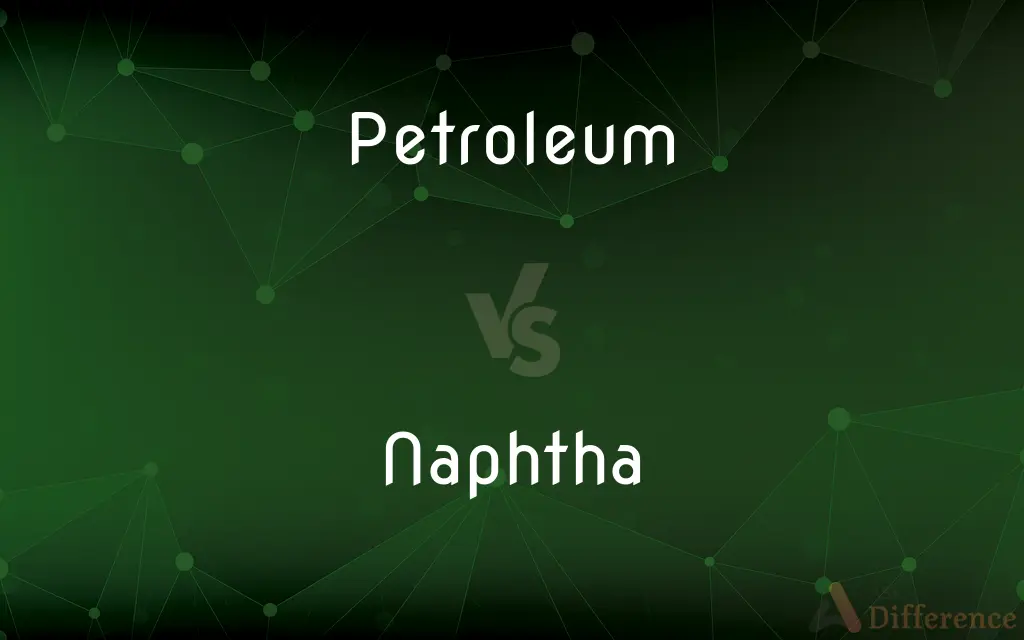Petroleum vs. Naphtha — What's the Difference?
By Fiza Rafique & Maham Liaqat — Updated on April 5, 2024
Petroleum is a complex mixture of hydrocarbons, essential for energy and manufacturing, while naphtha is a lighter fraction used as a solvent and in chemical synthesis.

Difference Between Petroleum and Naphtha
Table of Contents
ADVERTISEMENT
Key Differences
Petroleum, also known as crude oil, is a naturally occurring, yellowish-black liquid found in geological formations beneath the Earth's surface. It is primarily composed of hydrocarbons of various molecular weights, as well as other organic compounds. The composition of petroleum varies greatly depending on its source, but it is primarily used as a fuel source in its refined form. Naphtha, on the other hand, refers to a range of volatile, flammable liquid hydrocarbon mixtures. It is obtained from the distillation of petroleum or coal tar and is used primarily as a solvent, a fuel, and in the production of chemicals.
Petroleum is refined to produce a variety of products, including gasoline, diesel, jet fuel, heating oil, and asphalt. It is also a key raw material for the petrochemical industry, where it is transformed into plastics, synthetic rubber, and chemicals. Naphtha is lighter than most other petroleum products and is categorized into different types based on its distillation temperature range and chemical composition. It is a key feedstock for the petrochemical industry, especially in the production of olefins and aromatics, which are building blocks for plastics, synthetic fibers, and resins.
While petroleum is a raw natural resource that is refined into various products, naphtha is one of those refined products with specific uses, especially in the chemical industry. Petroleum's use is broader and includes energy production, heating, and as a base for countless petrochemical derivatives. Naphtha's role is more specialized, focusing on chemical synthesis and as a solvent.
Both petroleum and naphtha are critical to the global economy, but their environmental impact is a subject of concern. The extraction and refining processes of petroleum contribute significantly to pollution and greenhouse gas emissions. Naphtha, due to its volatile nature, also poses risks of pollution and health hazards if not handled properly. However, it is essential in the manufacture of numerous everyday products.
The distinction between petroleum and naphtha highlights the complexity of the petroleum refining process and the versatility of its products. While petroleum serves as a primary energy source and raw material for various industries, naphtha plays a crucial role in the chemical sector, showcasing the interconnectedness of modern industrial processes.
ADVERTISEMENT
Comparison Chart
Source
Natural deposits
Distillation of petroleum or coal tar
Composition
Hydrocarbons, organosulfur compounds
Lighter hydrocarbon mixtures
Use
Fuel, petrochemical raw material
Solvent, chemical synthesis
State
Liquid
Volatile liquid
Environmental Impact
High pollution and greenhouse gas emissions
Health hazards, pollution risk
Compare with Definitions
Petroleum
A thick, flammable liquid mixture of hydrocarbons.
The refinery processes petroleum into gasoline.
Naphtha
A volatile, flammable liquid hydrocarbon mixture.
Naphtha is used as a solvent in the paint industry.
Petroleum
Refined into various fuels.
Petroleum is distilled into diesel and kerosene.
Naphtha
Derived from the distillation of petroleum.
The refinery produces naphtha as an intermediate product.
Petroleum
The raw material for many chemical products.
Petroleum is crucial for manufacturing plastics.
Naphtha
Utilized in the petrochemical synthesis.
Naphtha is a feedstock for producing ethylene.
Petroleum
Extracted from the earth by drilling.
Petroleum deposits are found in offshore platforms.
Naphtha
Important for manufacturing plastics.
Naphtha undergoes cracking to produce plastic precursors.
Petroleum
Source of energy and industrial raw materials.
The global economy heavily relies on petroleum.
Naphtha
Acts as a cleaning and thinning agent.
Naphtha is used to clean oil and grease.
Petroleum
Petroleum (), also known as crude oil and oil, is a naturally occurring, yellowish-black liquid found in geological formations beneath the Earth's surface. It is commonly refined into various types of fuels.
Naphtha
Naphtha ( or ) is a flammable liquid hydrocarbon mixture. Mixtures labelled naphtha have been produced from natural gas condensates, petroleum distillates, and the distillation of coal tar and peat.
Petroleum
A liquid mixture of hydrocarbons which is present in suitable rock strata and can be extracted and refined to produce fuels including petrol, paraffin, and diesel oil; oil.
Naphtha
Any of several highly volatile, flammable liquid mixtures of hydrocarbons distilled from petroleum, coal tar, and natural gas and used as fuel, as solvents, and in making various chemicals. Also called benzine, ligroin, petroleum ether, white gasoline.
Petroleum
A thick, flammable, yellow-to-black mixture of gaseous, liquid, and solid hydrocarbons that occurs naturally beneath the earth's surface, can be separated into fractions including natural gas, gasoline, naphtha, kerosene, fuel and lubricating oils, paraffin wax, and asphalt and is used as raw material for a wide variety of derivative products.
Naphtha
(Obsolete) Petroleum.
Petroleum
A flammable liquid ranging in color from clear to very dark brown and black, consisting mainly of hydrocarbons, occurring naturally in deposits under the Earth's surface.
Naphtha
(dated) Naturally occurring liquid petroleum.
Petroleum
Rock oil, mineral oil, or natural oil, a dark brown or greenish inflammable liquid, which, at certain points, exists in the upper strata of the earth, from whence it is pumped, or forced by pressure of the gas attending it. It consists of a complex mixture of various hydrocarbons, largely of the methane series, but may vary much in appearance, composition, and properties. It is refined by distillation, and the products include kerosene, benzine, gasoline, paraffin, etc.
Naphtha
Any of a wide variety of aliphatic or aromatic liquid hydrocarbon mixtures distilled from petroleum or coal tar, especially as used in solvents or petrol.
Petroleum
A dark oil consisting mainly of hydrocarbons
Naphtha
The complex mixture of volatile, liquid, inflammable hydrocarbons, occurring naturally, and usually called crude petroleum, mineral oil, or rock oil.
Naphtha
One of several volatile inflammable liquids obtained by the distillation of certain carbonaceous materials and resembling the naphtha from petroleum; as, Boghead naphtha, from Boghead coal (obtained at Boghead, Scotland); crude naphtha, or light oil, from coal tar; wood naphtha, from wood, etc.
Naphtha
Any of various volatile flammable liquid hydrocarbon mixtures; used chiefly as solvents
Common Curiosities
Can naphtha be used as fuel?
Yes, naphtha can be used as fuel, particularly in some industrial processes and engines designed to run on light hydrocarbon fuels.
How do petroleum and naphtha differ in composition?
Petroleum is a complex mixture of various hydrocarbons and compounds, whereas naphtha is a lighter, more volatile mixture of hydrocarbons.
How is naphtha produced?
Naphtha is produced through the distillation of petroleum or coal tar, separating it into lighter hydrocarbon mixtures.
Why is petroleum important?
Petroleum is crucial for energy production, transportation, and as a raw material in the petrochemical industry.
What are the environmental impacts of petroleum?
Petroleum extraction and refining contribute to pollution, greenhouse gas emissions, and environmental degradation.
What industries rely on naphtha?
The petrochemical industry heavily relies on naphtha for producing olefins, aromatics, and as a solvent.
What is naphtha used for?
Naphtha is used as a solvent, a fuel, and a primary feedstock in the petrochemical industry for producing chemicals and plastics.
What is petroleum?
Petroleum is a naturally occurring liquid found beneath the Earth's surface, composed mainly of hydrocarbons and used extensively as fuel and raw material in various industries.
What is the primary source of petroleum?
Petroleum is primarily sourced from geological formations beneath the Earth's surface through drilling.
Can petroleum be replaced as an energy source?
While alternative and renewable energy sources are being developed, petroleum remains a primary global energy source due to its energy density and availability.
What types of products are derived from petroleum?
Products derived from petroleum include fuels like gasoline, diesel, jet fuel, as well as plastics, synthetic rubber, and chemicals.
Is naphtha hazardous?
Yes, due to its volatile and flammable nature, naphtha poses health hazards and risks of pollution if not handled properly.
How does the refining process affect the properties of naphtha?
The refining process determines naphtha's specific chemical composition and properties, tailored for its intended industrial use.
What role does naphtha play in plastic production?
Naphtha is crucial in plastic production as a feedstock for the steam-cracking process, leading to the production of olefins and other precursors for plastics.
How are petroleum and naphtha stored and transported?
Petroleum and naphtha are stored in large tanks and transported via pipelines, tankers, and railcars, requiring careful handling due to their flammable nature.
Share Your Discovery

Previous Comparison
Stirling vs. Sterling
Next Comparison
Gist vs. SummaryAuthor Spotlight
Written by
Fiza RafiqueFiza Rafique is a skilled content writer at AskDifference.com, where she meticulously refines and enhances written pieces. Drawing from her vast editorial expertise, Fiza ensures clarity, accuracy, and precision in every article. Passionate about language, she continually seeks to elevate the quality of content for readers worldwide.
Co-written by
Maham Liaqat













































